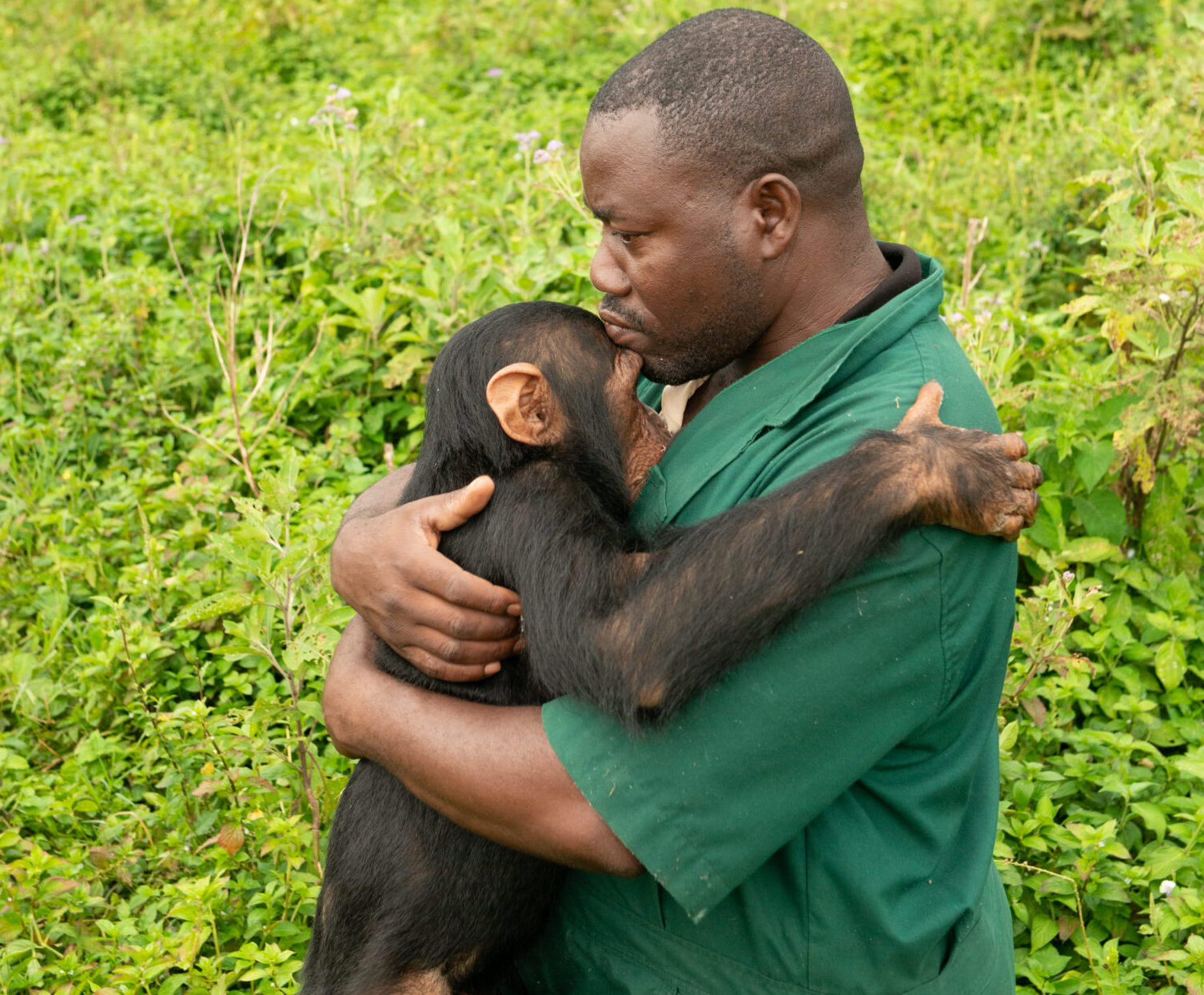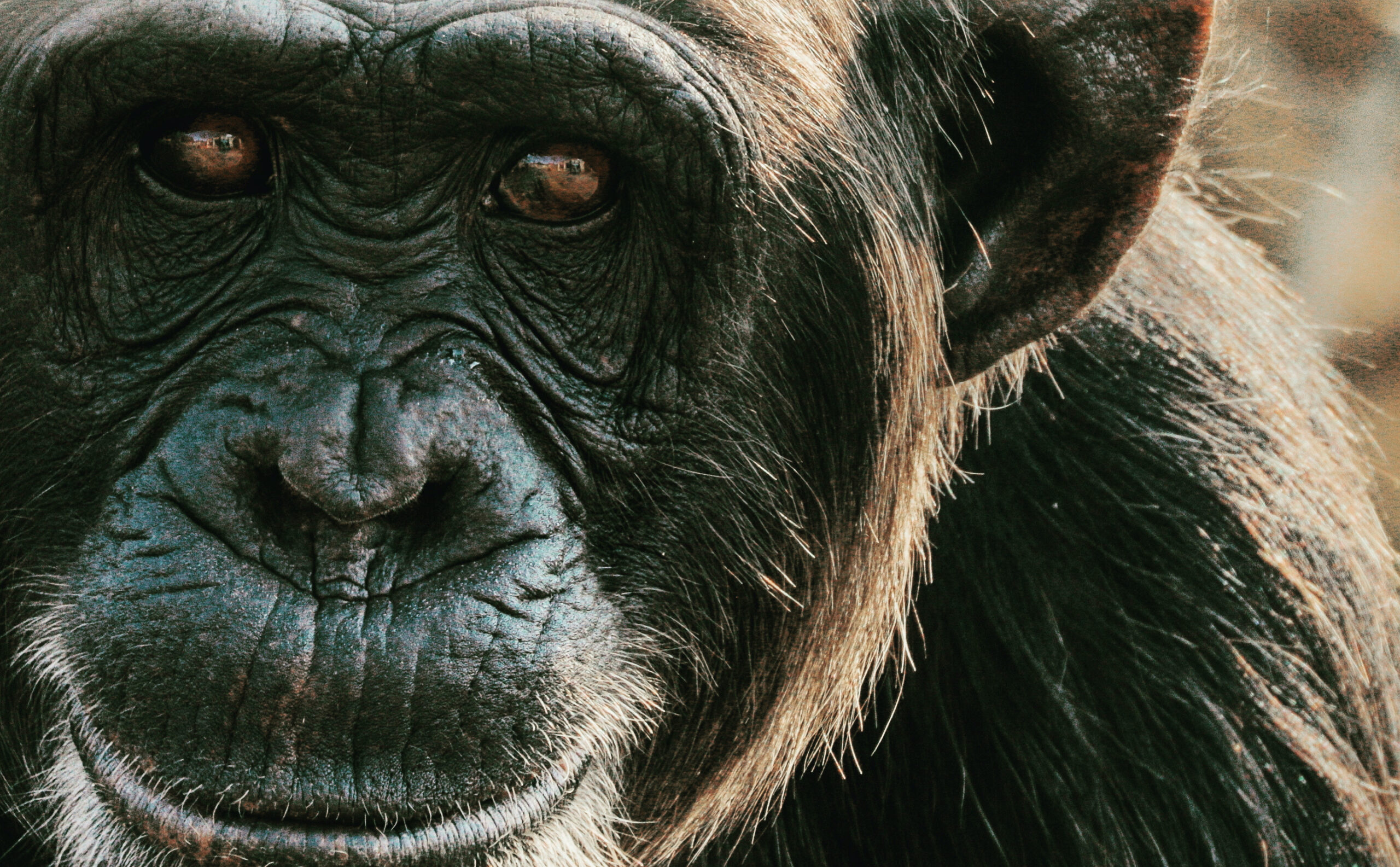
Stany Nyandwi has been fighting to save chimpanzees from extinction for 30 years and explains how he escaped a civil war to help rescue them.
By Heather Newgen
From his first interactions with chimpanzees, Stany Nyandwi had an intuitive understanding about them. He learned their pant- hoot language, their behavior and knows the primates so well Dr. Jane Goodall refers to him as the "chimp whisperer." His work with the animals has been impressive from the start and Nyandwi plays an integral role in educating others about the importance of chimpanzees in an effort to stop their senseless killings, which you can see in the short film about his life Pant Hoot. But, Nyandwi overcame unbelievable circumstances and risked his life to save the chimps.
"Both my parents, brother and other family members died in the war. I had to leave to save the chimps from the war. I then got stuck in Kenya and wasn’t allowed back into the country. I left Burundi in 1995, two years after the war started, to save 20 chimpanzees to be taken to Kenya (Sweetwater’s sanctuary), as they would have died in the war. When I arrived there the war escalated back in Burundi and I couldn’t return to my family. I couldn’t talk to them for four years, and I didn’t even know if they were still alive. The chimps helped me through the difficult time, and somehow became my family," he told The Voluntourist.
In an exclusive interview, Nyandwi discusses the Burundi genocide, how he fled the country and his passion for chimpanzees.
 Image by Pant Hoot film
Image by Pant Hoot film
The Voluntourist: Why didn't the rest of your surviving family relocate to South Africa with you?
Stany Nyandwi: I only started working with the Jane Goodall Institute South Africa- Chimp Eden in 2014, long after the war, and I do see my family, but my work, dedication and passion for chimpanzees often takes me on the road and long periods without going home.
The Voluntourist: Is your family still in Burundi?
Stany Nyandwi: Some of my sisters, but my wife and children are in Uganda.
The Voluntourist: How often do you talk to them?
Stany Nyandwi: With technology these days and a good wifi connection at the sanctuary I can speak to them every day.
The Voluntourist: Any chance of reuniting with them?
Stany Nyandwi: Yes, now I go home once a year for a month, but my help and experience is sometimes needed in other countries and that might change again in the future.
The Voluntourist: How did you escape Burundi?
Stany Nyandwi: On a small aircraft with the chimpanzees we had to save from the war.
The Voluntourist: At what point did you discover the gift you have with chimpanzees?
Stany Nyandwi: A few years after joining The Jane Goodall Institute in Burundi, I started going on rescue missions, and I remember we were looking for an infant chimp that was held illegally by community members that were trying to hide her under the bed so we couldn’t find her. I walked around the yard and saw small chewed fruit scraps and signs that a chimp was close by. We couldn’t find anything and thought they had moved her, and we were about to give up, when I decided to walk into the house again and pant hooted. The chimp responded to me from under the beds and we were able to rescue her. It is then that I realised that I might have a gift to help these animals.
The Voluntourist: How did working with chimpanzees give you new meaning and purpose?
Stany Nyandwi: I realized how similar they are to us humans and that they feel all the emotions that we do, and make lifetime bonds with each other and with us. They have no voice to fight against humans, so I decided to fight for them.
The Voluntourist: How do you build a bond and trust with a chimpanzee?
Stany Nyandwi: It takes a lot of time and patience, and each one is different. You have to be able to understand not only their vocalizations but also their body language. If a chimp sees that you understand and want to help him, they slowly start communicating back and that, even for humans, is the start of building a relationship.
The Voluntourist: How are chimps similar to humans?
Stany Nyandwi: They share 98.7% of our DNA, they have unique fingerprints like we do, and they have different physical features, so no one looks the same, and they have unique voices. They share all of our emotions such as jealousy, anger, love, impatience and fear, etc. They tickle each other; they laugh, and give each other hugs and kisses.
The Voluntourist: Please explain what pant- hoot is and how important it is to use the correct one when communicating with chimps?
Stany Nyandwi: Pant hoot is the name that you can call their language, such as English or French. But there are so many different words in a language, that it all depends on the situation. For example, using the vocalizations for fear or danger will confuse them if you meant to use happy vocalizations. But we have to remember that together with pant hoot, they also read our body language. We can’t easily fool them.
The Voluntourist: What are some of the techniques you've developed to care for chimpanzees and how have those techniques helped others interact with chimps?
Stany Nyandwi: During escapes, it helps to know and use their language and vocalizations to defuse the situation, distract them, and convince them to do and go where you want. This is a technique I have used many times, but it all depends on which chimpanzee it is, and you have to be able to read them quickly and change your strategy. Integrating chimpanzees with each other is very difficult and takes a long time. You have to have patience and make use of an opportunity when it arises. I have developed many techniques and tricks you could say to make this process easier, which I train staff in.
The Voluntourist: Why is the work you do with chimpanzees so important to you?
Stany Nyandwi: Chimpanzees are our closest relative in the animal kingdom, and we can learn so much from them. We as humans have to stop destroying animals and their environment and start saving them. As Dr. Jane Goodall says: “If we kill off the wild, then we are killing a part of our souls.” To me, human redemption lies in saving the natural world.
The Voluntourist: Why are people killing chimpanzees and how close are they from going extinct?
Stany Nyandwi: People kill them for meat, witchcraft, entertainment, medical research and they kill many adults to steal the babies and sell them on the illegal pet trade markets.
The Voluntourist: How does The Jane Goodall Institute Chimp Eden sanctuary in South Africa help chimpanzees?
Stany Nyandwi: Chimp Eden rescues chimpanzees that have survived the bushmeat trade, some were ex-pets or from circuses and labs. The sanctuary gives them a second chance at a better life, with large natural enclosures, family members, good nutrition and importantly we educate visitors from all over the world and many school children on the importance of the environment and why we should change they way we impact the world around us. As our founder Dr. Jane would say “What you do makes a difference, and you have to decide what kind of difference you want to make.”
The Voluntourist: How do chimps find their way to the sanctuary? Are they released back into the wild or live at the sanctuary permanently? Currently 33 chimps live at The Jane Goodall Institute Chimp Eden. How many can the sanctuary take in?
Stany Nyandwi: The chimps are rescued through a network of people, sometimes just a concerned citizen that will contact the sanctuary. This will be their permanent home, these chimpanzees will not survive in the wild as they could take human diseases back to the wild populations and be a danger to local communities because they have lost their natural fear of humans, and on top of that, there isn’t much rainforest left. Humans are destroying their habitat for timber, agriculture, palm oil, etc. The sanctuary can accommodate many more chimpanzees, but we first need to fundraise to purchase the land that the sanctuary is on, to secure it for the future.
The Voluntourist: How does education play a role in eliminating extinction?
Stany Nyandwi: It is the only thing we can do to stop the extinction of many species. We need to educate our children so they do not become poachers, animal exploiters, and trophy hunters. We need to teach them that circuses that abuse animals should be closed down, wild animals shouldn’t be pets and that certain unnecessary cultural beliefs are killing the environment and in doing that we are destroying ourselves.
The Voluntourist: What is the reaction from local villagers when teaching them the importance of chimpanzees?
Stany Nyandwi: At first they are reluctant to listen and feel that these animals make life difficult for them, but with patience and education they realize they these animals are also just trying to survive and protect their families. The important work we do with animal wildlife conflict is not necessarily to make people love these animals, but just to live in harmony with each other.
The Voluntourist: What can others do to help chimps?
Stany Nyandwi: Support the important work sanctuaries like The Jane Goodall Institute South Africa is doing. Do not support products that exploit the environment such as unsustainable palm oil, tobacco and cosmetic products that are tested on animals, and in general to reduce our meat consumption and carbon footprint, and live more sustainably.
To learn more about Stany Nyandwi check out the short film Pant Hoot, which highlights his incredible work and journey.
